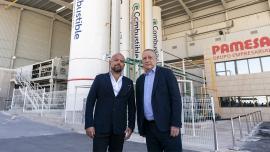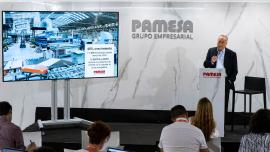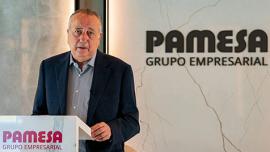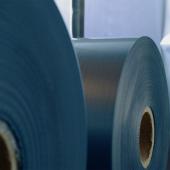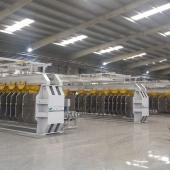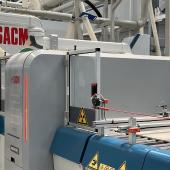Grupo Pamesa's 2020 revenues soar to 782 million euros
Fernando Roig confirms 11% growth in consolidated turnover compared to 2019, a 20% increase in ceramic sector revenues, 91 million euros in investments and 527 new jobs
Pamesa’s seemingly unstoppable growth continues year after year, even throughout a global pandemic. The growth trend is confirmed by the results achieved in 2020 and the forecasts for 2021 announced on 2 June by Fernando Roig, owner of the Spanish ceramic group, Europe’s top tile manufacturer and the seventh largest producer in the world.
Despite reduced activity in April and May 2020 due to the Covid-19 pandemic, Grupo Empresarial Pamesa (which also produces spray-dried bodies and chemicals and operates in the energy sector) posted consolidated revenues of 782 million euros in 2020, up 11% on the 704 million euros of 2019. The increase in the ceramic sector alone was 20%. Pre-tax profits also rose sharply (+56%) to 66 million euros.
“During these first 5 months of 2021, all the group’s brands [in the tile sector: Pamesa, TAU, Geotiles, Navarti, Prismacer, Ecoceramic, Cottocer and Compacglass, Editor] have continued to perform very strongly compared to 2020 with a 63% increase in tile sales,” said Fernando Roig. “Considering that April 2020 was a month of total lockdown, this growth rate will not be sustainable over the entire year, but we expect it to remain very high. In 2021 we are anticipating a consolidated turnover of 900 million euros and tile sales in excess of 130 million square metres.”
- Investments of 160 million euros in two years
The group invested an impressive 91 million euros in 2020, mainly for the purchase of land in Vila-real and Onda for future expansion, the installation of new production lines, the renovation of Geotiles’ offices and showrooms, and the complete refurbishment of the Cottocer factory with the installation of new machinery. Two new kilns were also started up in the Compacglass facility in Onda.
Investments totalling no less than 70 million euros are also planned for 2021, as usual financed by the group’s own capital. These include the refurbishment of the offices in the Pamesa Cerámica headquarters (6,387 sqm in total, including 3,000 sqm for the new showroom) which will be completed by the end of 2021, the new 140,000 sqm logistics centre and the new raw materials warehouse (52,000 sqm) to be built alongside the TAU factory.
Added to this is the acquisition, completed last March, of PLP Pulidos La Plana (renamed Pulidos Pamesa), a company with 45 employees (all of whom have been retained), set up in 2015 and specialising in the polishing, cutting and grinding of ceramic surfaces. With this operation, Pamesa has acquired a more than 7,000 sqm facility with state-of-the-art machinery which will increase the group’s polished tile production capacity to 360,000 sqm per month, an increase of 27%.
But Fernando Roig’s plans also include increasing the group’s total production capacity by 40% between 2021 and 2022 by installing new kilns both in the group’s own plants and in those of its external suppliers.
“Our aim is to make investments that will allow us to continue to grow over the next few years and thereby respond more effectively to market demand and continue to create jobs,” says Roig. “In short, the strong results we have achieved to date are based on a constant commitment to investment and innovation, as well as a formula I call the 3 W’s: work, work and more work.”
- Attention to employees
As regards employment, the strong business performance, investments and corporate culture that has always distinguished Grupo Pamesa have enabled the group to create 527 new jobs compared to February 2020, making a total of 2,680 direct employees today (+24%), 80% of whom are on permanent contracts and 20% of whom will be given a permanent position on completing their first year of service.
Confirming the policy announced by Mr Roig at the beginning of the pandemic, the group did not resort to any kind of redundancy scheme (in Spain there are two mechanisms referred to by the acronyms ERE and ERTE) but maintained its policy of granting incentives to all employees with at least 6 months of service by handing out 6.5 million euros in bonuses. The group also earmarked 1.4 million euros to ensure the safety of employees through protective measures and equipment and performed 21,600 swab tests.
- A commitment to sustainability
Last but not least, a commitment to the environment has been an integral part of Pamesa’s corporate policy for the past five years. Thermal energy consumption has been reduced by recovering heat from the kilns, while the 95,555 sqm of photovoltaic roofs installed across the group’s various facilities (a total capacity of 17.80 MW) meet most of the electricity needs of the production lines (equivalent to that of 4,000 homes), as well as avoiding the emission of 8,816 tonnes of CO2 into the atmosphere each year.
The group also confirmed its zero-waste policy, recovering 100% of its own solid and liquid waste and recycling wastewater originating from other ceramic companies in the district.
Did you find this article useful?
Join the CWW community to receive the most important news from the global ceramic industry every two weeks







